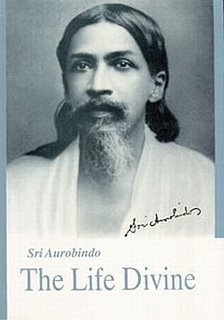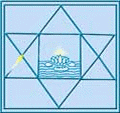 |
Book II
The Knowledge and the Ignorance-The Spiritual Evolution
Chapter 8
Memory, Self-Consciousness and the Ignorance
Part II
Knowledge and Ignorance
Our mind is poised in Ignorance, not on absolute Inconscience but on a limited and conditioned knowledge of being. We are limited by a temporal view of successive momentary experiences, have a scanty memory of the past and a doubtful inference of the future. If real existence is a temporal entity, we have no knowledge of the real being; if real existence transcends time, the mind is still more ignorant of it. If mind is the index of our being then we are nothing else but Ignorance fleeting through Time. "But if there is a power of self-knowledge beyond mind which is timeless in essence and can look on Time, perhaps with a simultaneous all-relating view of past, present and future, but in any case as a circumstance of its own timeless being, then we have two powers of consciousness, Knowledge and Ignorance, the Vedantic Vidya and Avidya." (SABCL !8, pg.505) Vidya is knowledge of the Timeless Oneness, Avidya or Ignorance is the knowledge of the multiplicity in Time. They might be separate powers or if they are connected, "it must be this that consciousness as Knowledge knows its timeless self and sees Time within itself, while consciousness as Ignorance is a partial and superficial action of the same Knowledge which sees rather itself in Time, veiling itself in its own conception of temporal being, and can only by the removal of the veil return to eternal self-knowledge." (Ibid)
|
|
It would sound irrational to suppose that the Superconscient is ignorant of time and Space and Causality. Rather from the larger ancient Vedantic view we must consider ourselves not as a dual being but as "one conscious existence with a double phase of consciousness" --- "one, a knowledge situated in Time....the other, timeless, works out with mastery and knowledge its own self-determined conditions of Time". (Ibid, pg.506) Both phases are equally important.
This brings us to appreciate the Upanishads when it considers the Brahman as being both the Knowledge (knowledge of oneness) and the Ignorance (knowledge of multiplicity). Knowledge is consciousness of the timeless and spaceless unconditioned Self which holds in its bosom the "temporally eternal successions of the universe". (Ibid) Ignorance is consciousness of the being in successions of Time and divisions of Space. It is called Ignorance because it is unaware of the unity of the transcendent and universal Reality and therefore its view of reality is partly true and partly false. On the other hand, an exclusive Knowledge of the unity of Reality is ignorant of the manifest Brahman and is therefore a kind of blindness too. "In truth, neither is precisely darkness, but one is dazzling by a concentrated Light, the other the illusive proportions of things seen in a dispersed, hazy and broken light, half-mist, half-seeing. The divine consciousness is not shut up in either, but holds the immutable One and the mutable Many in one eternal all-relating, all-uniting self-knowledge".(Ibid,pg.507)
Memory as a crutch
Memory is a crutch used by the mind, it is a poor substitute for "an integral direct abiding consciousness of self and a direct integral or global perception of things".(Ibid) Mind can have the direct consciousness of the inner self whereas the perception of outer things in the time-space matrix is half-direct and unsatisfactory. It of course makes up for that defect through "memory, imagination, thought, idea-symbols of various kinds". (Ibid) What is independently perceived is the self-consciousness at the present moment. Through it one can approach the eternal being. The rest that is the outside world is perceived with error, ignorance and illusion. The Illusionist holds the outside world unreal while the eternal self is held to be truly real. Buddhists regard the eternal self too to be illusory and the mind to be existent as well as non-existent which ultimately must cease in the timeless repose of the Eternal.
The Eternal Self holding mobility and immobility
But there is stable consciousness behind the mind which embraces "all the mobile experiences of the Time-self and holds them on the foundation of the immobile timeless self." (Ibid, pg.508) We can become aware of this consciousness when we stand behind the mind or when the mind has become silent. But if we view only its timeless status we might think that it is not only timeless but actionless, without movement of idea, imagination, memory and self-absorbed. This then becomes real to us and the rest of experiences a dream. But this self-absorption is only an act. "The real self is the eternal who is obviously capable of both the mobility in Time and the immobility basing Time, --simultaneously, otherwise they could not both exist; nor, even, could one exist and the other create seemings". (Ibid) This is the Supreme Self or Being of the Gita which holds both the immobile and the mobile being as "the self and lord of all existence." (Ibid)
Thus we have the vision of "an eternal conscious being who supports the mobile action of mind on a stable immobile self-consciousness free from the action of Time and who, while with a knowledge superior to mind he embraces all the movement of Time, dwells by the action of mind in that movement". (Ibid, pg.509) It is difficult to appreciate this by a fleeting ephemeral being seizing uncertain things without stability who puts all experience in the past, partly saved and stored by memory. But in reality he is the same Eternal poised in His supramental knowledge that is ever stable "for it is himself that he is mentally experiencing in the succession of Time". (Ibid)
"Time is the great bank of conscious existence turned into values of experience and action".(Ibid) The surface being coins up the past continually in the present and uses it as coin of knowledge in the commerce of the present to create the new wealth of the future. "Ignorance(knowledge of multiplicity) is a utilsation of the Being's self-knowledge in such a way as to make it valuable for Time-experience and valid for Time-activity; what we do not know is what we have not yet taken up, coined and used in our mental experience or have ceased to coin and use."(Ibid)
Actually, behind all is ready for use by the Self in dealings with Time and Space and Causality. It can almost be said that the surface personality is "only the deeper eternal Self" (Ibid, pg.510) thrown out as an adventurer in Time, gambling in infinite possibilities but limiting itself to the succession of moments so as to have the delight in adventure, "keeping back its self-knowledge and complete self-being so that it may win again what it seems to have lost, reconquering all itself through the chequered joy and pain of an aeonic passion and seeking and endeavour".(Ibid)
Date of Update:
23-Jan-24
- By Dr. Soumitra Basu
|

